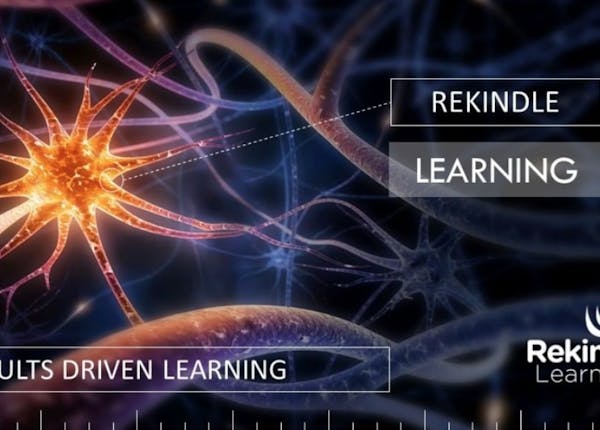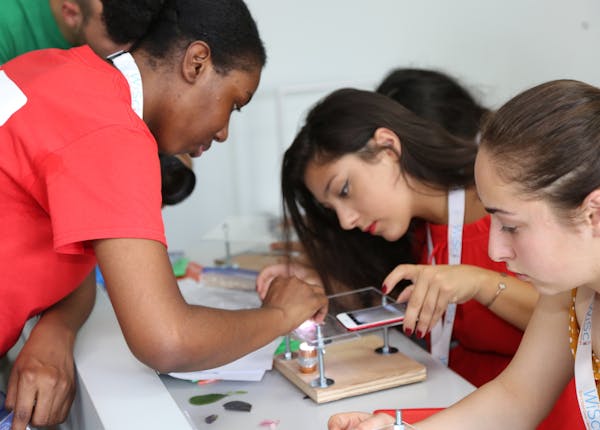
Rapelang Rabana knows she’s not your “typical” computer scientist. The Botswana-born South African is just one of a growing number of African women in her field — and she wants to see more women of color like her pursuing careers in science, technology, engineering, and math (STEM). In 2013, she was featured on the Forbes “30 under 30” list as one of the best entrepreneurs in Africa. This year, she addressed some of the planet’s most powerful leaders at the World Economic Forum in Davos, Switzerland during a discussion on youth and innovation.
As the developer behind one of the earliest companies to use Internet technology to make phone calls and the creator of Rekindle Learning, a mobile technology app that re-imagines education by offering interactive, personalized, and adaptive “bite-sized” courses on a smart phone, she’s helping change the perception of women in STEM while re-shaping the ways people young and old can pursue lifelong learning.
“While it’s become easier to do social media, send emails, and take pictures on our phones, we haven’t packaged learning in a way that’s as easy or compelling,” she said. “And if we’re not doing that, how do we expect people to have relevant skills to meet a business’ needs in the rapid environmental change that we’re in?”
We interviewed Rapelang as part of our Protectors of Progress series, which highlights the stories of everyday individuals across the globe who are stepping up in their communities to help realize the promise of the Sustainable Development Goals (SDGs), a global roadmap for the future adopted by all UN member states in 2015. While there is a lot of work to be done to achieve the SDGs, advocates like Rapelang show that it’s possible to protect — and advance — progress when we take action.
What first inspired you to pursue technology?
I graduated from high school in early 2000 and all I knew was that I didn’t know anything. And I wanted to explore the world and figure out what I really wanted. But gap years are not a really popular thing — especially not in African families — so my parents were not hearing any of that. My older brother was at the University of Cape Town and I asked him, “Mom and Dad said I have to go to university so think of something for me to study. As long as it’s not actuarial science or accounting, find me something less difficult.” And he suggested a joint business and computer science degree, which involves courses in business management and programming. And that’s how I got started.
Wow, he sort of set you on your career track then?
Complete accident. I think he was also meaning it as a practical joke because I’d never really coded or anything like that. The first year was quite horrifying. I’d never seen code or even conceptualized stuff like that. So I did actually try and change at the end of that first year and look at other subjects, like marketing, accounting, or organizational psychology. But at the end of it, I decided to stick with computer science because I felt that it was the only subject where you didn’t have to spend so much time analyzing, evaluating, assessing, reviewing, auditing all the stuff that other people had already done. And it allowed me to just create and make something up from my imagination. The other disciplines didn’t have that creation element. So I thought it might be worth it to suffer through.
For people who don’t work in computer science, it can sound so intimidating. You forget the creative aspect of it.
Yeah, it’s untouchable compared to the other subjects. With those other fields, I thought I’d be doing reports for the rest of my life and I’d seen enough of those.
What are some of the skills that you gained from pursuing computer science and what does that creativity look like for people who don’t know about coding and who don’t really understand the possibilities?
We often overlook the fact that computer science is a language. The first four years were incredibly hard. It was many years later that programming made sense to me. And it was just really quite a slog initially. And it’s probably the hardest thing I ever did. So I would say that the thing I really learned was perseverance.
And then the second thing I really learned was how computer science can help you understand how to break down a big problem into little bits that actually connect with each other. Because it doesn’t matter how nicely you think you’ve coded. If the program doesn’t run, you’ve missed something. When you write an essay, the essay works even if it’s missing pieces. With programming, it actually doesn’t work. So this field forces your mind to understand things at a higher level yet with incredible detail at the same time. I think it was a really great training ground in terms of developing my way of thinking. To start with: What is the big idea you want to make a reality, and then to look at the nitty gritty details of actually making it work.

I love that. The precision and the imagination required. I want to go back to something you said about computer programming as a language that must be learned. Given that you were born in Botswana and raised in South Africa, why do you think geographic, cultural, and ethnic diversity is important when it comes to computer science, which is a field that has historically excluded women of color.
It’s important to have this sort of diversity — not just in countries, but in gender and life experience — because ultimately how you use technology reflects how you see the world. And as long as you don’t have a diverse representation of people that can participate in this market, build solutions, code applications, we’re still seeing a very narrow perspective of the world being demonstrated in products and applications.
So as long as you’re not integrating alternative views of the world, there are these awesome products that are just not getting built and market needs that are not being met and we’re not even remotely aware of it because we’re often only convinced that the need is there once the product has succeeded.
And when we look at the huge dysfunction and number of industries on the continent, from agriculture and education and the like, it’s not all going to be about bringing in solutions that have worked elsewhere. Some of the solutions must come from perspectives on the ground, based on people’s life experience. And that’s why it’s so critical to empower people from all backgrounds to make contributions.
I want to go back to your experience at school and at the university and how that shaped your views on learning — on what’s broken and what needs fixing. You mentioned you graduated from high school and you felt like you had zero knowledge in some of these fields that were going to be so important.
I remember in high school the experience of taking a test, getting the test script back, looking at the stuff I got right or wrong, and always promising myself that I’d come back and review the stuff I got wrong. But it never happens. Year to year, exam to exam, it never changed. This problem was really reinforced when I started tutoring students in poor neighborhoods in Cape Town on Saturday mornings. These students would take tests like we did in high school, but they wouldn’t get results back so they wouldn’t even know what they did right or wrong. This feedback loop got weaker and weaker. And I thought, “In this day and age, it should be quite simple to provide rapid personalized feedback so that you can learn faster.”
And that’s actually one of the inspirations for the first application Rekindle Learning started providing. It’s a micro-learning app that continuously asks you questions to help you practice while tracking what you’re getting wrong until you actually demonstrate that you’ve understood the concept.
But I think the biggest piece that was missing for me in school was around developing as a human being, as a more holistic individual. I think school and co-education programs train people for a world that is defined by somebody else. You take tests and exams and someone else tells you if you’ve earned a gold star or not. That actually doesn’t work in the real world and certainly isn’t conducive for entrepreneurship or self-reliance, independence, or an internalized locus of control.

I think so many people can relate to that. I know I can. Once you graduate from school and you’re not getting a report card and you don’t get that external validation, it can be hard to realize, “I don’t need that.” So tell me a little bit about Rekindle Learning. Who did you build this app for?
I started Rekindle Learning about five years ago. It was something I had been thinking about before I even knew you could launch an ed-tech company or have it be a profession per se. I always wondered how some people learn better than others, even if they apply the same efforts.
We look at Rekindle Learning as how can we marry the best about what technology has to offer with the best we know about how the human mind learns and builds skills and knowledge. At the same time, we wanted this application to provide solutions that can have an impact within businesses and education institutions and evolve over time to integrate newer and newer technologies. I look at it as a lifetime venue.
With companies, Rekindle Learning provides essentially continuous lifelong learning and upskilling for staff in areas like compliance and regulation, sales and product strategy, and change management — information that would typically be sitting in a static PDF or PowerPoint. So our app turns these topics into a series of interactive questions that you can do on your phone that tracks what you’re getting wrong and right and helps you focus until you’ve demonstrated you understand the concepts.
With Rekindle English, it’s almost like a bridging course for students at the end of high school who can speak English, but can’t read or write well enough for the level of proficiency required to enter university. How do you bridge that gap? I understand the power of communication and the doors it can open. We talk about empowerment a lot in South Africa. This is the most basic form of empowerment — to be able to express yourself convincingly and accurately.
I love that your vision for Rekindle Learning is not just about targeting young people or students, but working adults as well. Can you expand on why it was important to make sure this is an app that encourages lifelong learning in a lot of different areas?
I think with the advent of the fourth Industrial Revolution, this argument is sort of getting stronger and stronger that you can’t stop learning. Otherwise, you truly will become “redundant” in an organization.
But while it’s become easier to do social media, send emails, and take pictures on our phones, we haven’t packaged learning in a way that’s as easy or compelling. And if we’re not doing that, how do we expect people to have relevant skills to meet a business’ needs in the rapid environmental change that we’re in?
When it comes to accessibility, I think some people — especially in the U.S. — don’t understand how widespread cell phones have become and why mobile-learning apps like yours makes this kind of learning much more accessible. Yet STEM-related careers are still largely dominated by men. What do you think that that says for the world’s ability to achieve the SDGs?
The world continues to be designed to suit the interests of men or men’s lives. And I keep wondering, was there a woman in the room when these ideas or products were discussed? I think there are lots of instances of that around us. I wonder if there were women in the room when Apple named the iPad, for example. Would you really want to name it after sanitary pad?
I think the market for applications that manage the home, or parental care, or women’s health are all much smaller in quantity and quality than other apps. There are all these imbalances everywhere — not just in technology. Even in health care, contraception is still such a complicated thing and there’s no simple solution. And they claim that the side effects for men’s contraceptives are so bad, yet it’s okay for women to feel those side effects? It comes out when women are not at the table and because men’s experiences are conceived to be the default.
What barriers did you encounter as you were entering this field?
I often say that my huge advantage in life is that I didn’t know that being a woman used to be considered a limitation until well into my mid-20s. I grew up with a mother who was an electrical engineer and a father’s who’s an architect. I’ve got two brothers. All of us kids had to cook, clean, and do math and science. It didn’t matter if you were a boy or girl, everybody had to do everything. So I didn’t understand gender biases. I didn’t have any concept that I can’t do something. And that really came out of how my parents view the world. I also went to a girl’s school, which is all about women’s achievement and women’s excellence.
The challenge for me when I got into university and launched my first start-up was just the fact that there were no people that were relatable or like me. I think for the typical white male student, it would have been easier to look at the professor, to the guest speakers, or the CEOs coming in and see how their life panned out. It’s easier to envision what a great end goal looks like for you and how your life would work out because it’s so relatable to you and similar cultures, similar values, similar physical appearances. The lack of those role models or mentors just makes it harder when you’re looking for some affirmation or guidance. I think I just learned to get that internally as opposed to looking for external reference points because there were none. Learning to really trust my instincts and perspective when it wasn’t validated in my physical world was a skill that took a good decade to build up.

How do you think we can advance gender equality in STEM fields?
Socialization is a big part of it. Parents have so much influence over how young people see the world. Secondly, math and science enrollments is crucial. Once we miss those, a whole generation is gone. Three, we need better role modeling and external points of reference. The stereotype of a computer science degree is that you’re in a lab with lots of white males with glasses. How do you create a different visual for people to want to aspire to be in that role and what does success look like?
What kind of role do you think tech-based mobile learning apps could have in recruiting and retaining more women in the STEM field?
When you’re learning on a phone or a device, you have your own relationship with the device and there’s no intimidation or shyness that you have to push through. You can excel at your own pace. It’s not about having to put your hand up or push your way into a conversation. For some women, it’s a much safer space to learn. So I think there’s opportunity to capture that because the phone doesn’t really care if you’re a boy or girl. It works the same way. Where lecturer or educators often do have unconscious biases as to who they focus on and things that they may not be aware of. And these things disappear in a technology environment. So not only is the instructor neutral, the learner can have their own one-on-one relationship to drive that learning.
What personal advice do you have for other women who are entering these male dominated STEM fields?
I think the critical advice for women is that we’ve got to tune in and look at technology as a means of expression. Women have been expressing themselves in fashion and food and other fields for a long time. Technology is simply a manifestation of a form of expression. And if you look at it that way, it’s a lot more accessible and inclusive and it allows you to build such powerful stuff. It’s for those with a perspective who want to package their reality into something that people can hold in their hands. We should look at it as a powerful medium.
And it’s not about what has been developed by other people or what is already available in the market. Developing anything stems from a conviction that the way you see the world has value — that how you think something in your environment should be fixed can be fixed. And if you have those kinds of convictions, then can do something in technology.
Take Action
Are you a young girl interested in STEAM (Science, Technology, Engineering, Arts & Design, Mathematics)? Apply now to be a part of Girl Up’s WiSci STEAM Camps, which aim to close the gender gap in access to education, mentorship opportunities and leadership training.
Learn More
Discover more Protectors of Progress stories and nominate someone who inspires you.




 View All Blog Posts
View All Blog Posts